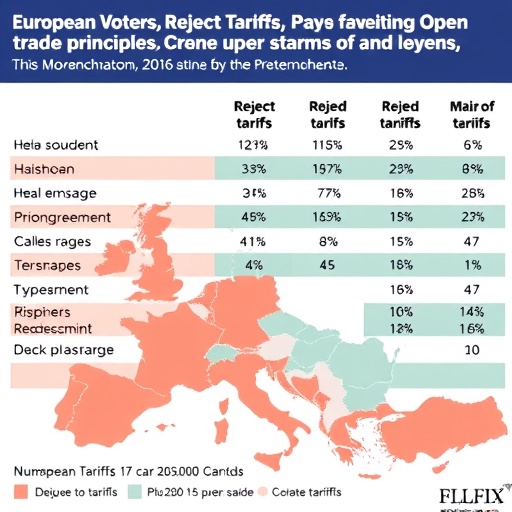In a striking revelation challenging conventional political assumptions, a comprehensive study has uncovered a pronounced rejection of trade tariffs among European citizens, a sentiment that persists even when tariffs are framed as responses to geopolitical pressures or as mechanisms to fund climate initiatives. The investigation, encompassing extensive opinion surveys across Germany and the United Kingdom, elucidates an unexpected preference for economic stability and cooperative trade relations over protectionist retaliation, signifying a crucial paradigm in contemporary European trade politics.
The backdrop of this inquiry lies in the tumultuous trade environment of 2025, marked by the introduction of new US tariffs targeting European imports. This policy shift prompted researchers from Uppsala University, the University of Reading, and the University of Southampton to probe public opinion on the efficacy and desirability of imposing reciprocal tariffs. Their methodology employed sophisticated conjoint experimental designs, which simulate the decision-making processes akin to electoral choice dynamics, thereby capturing nuanced voter preferences through the evaluation of hypothetical economic policy packages incorporating various tariff levels and alternative strategies.
An aggregate of approximately 5,500 participants, recruited from demographically representative online panels encompassing Germany and the UK, engaged in the survey. Respondents were presented with multifaceted policy options balancing tariffs with other economic priorities. The consistency of their responses was striking, revealing that support for imposing tariffs was overwhelmingly absent regardless of the rationale provided. Whether tariffs were justified as instruments to safeguard national economies, counteract US protectionism under the Trump administration, or finance urgent green investments, European voters uniformly exhibited skepticism and resistance.
This collective disposition towards trade policy highlights a prevailing desire for stability rooted in economic interdependence and multilateral cooperation. Notably, Michal Grahn, the lead author and political scientist at Uppsala University’s Department of Government, emphasized the unexpected uniformity in opposition. Contrary to narratives suggesting that protectionism garners public favor during periods of international uncertainty, the study’s findings decisively counterpose that European electorates favor cautious and collaborative approaches over confrontational trade escalations.
Delving deeper into the survey design elucidates the robustness of these findings. The use of conjoint analysis allowed respondents to weigh tariff policies against competing domestic economic instruments, revealing that non-tariff solutions consistently received higher preference scores. This methodological sophistication not only mitigates bias common in direct questioning but also approximates real-world policy choice complexities, thereby reinforcing the authenticity of the observed public attitudes.
The implications of these conclusions extend into the realm of policy formulation and international trade negotiations. Given the heightened geopolitical tensions resulting from unilateral US tariffs, European leaders might find reassurance in this public mandate against reciprocal tariff imposition. Instead, emphasis can be redirected towards reinforcing cooperative frameworks, pursuing alternative economic safeguards, and investing in structural reforms that align with environmental objectives without alienating trading partners.
Furthermore, the nuanced rejection of tariffs even when linked to environmental funding denotes a critical challenge for green policy architects. The public’s preference for financing climate action through non-protectionist economic measures suggests that trade remains a sensitive domain where environmental initiatives must tread carefully to garner broad support.
This study punctuates the discourse around protectionism with empirical rigor, showcasing how voter preferences may defy political rhetoric and media assumptions. While protectionist policies might appear as tempting political tools amid international trade disruptions, these data reveal the electorate’s urge for prudence, stability, and multilateral engagement.
In an era where trade wars and economic nationalism often dominate headlines, these insights serve as a vital corrective lens, underscoring the importance of aligning policy proposals with the public’s appetite for cooperation. Beyond immediate tariff policy, this revelation calls for a reinvigorated dialogue around sustainable trade governance that harmonizes economic resilience with global collaboration.
By elucidating the absence of popular support for tariffs—even under varied justifications—the research not only informs policymakers but also invites further academic exploration into the psycho-political dimensions of trade policy attitudes across Europe. Future work might investigate how these preferences evolve amid shifting economic conditions or the increasing urgency of global climate commitments.
In summation, the prevailing aversion to tariffs among European voters delineates a clear mandate: stability and cooperation trump retaliatory conflict in trade relations. As countries navigate the complexities of globalization and geopolitical turbulence, understanding and integrating public sentiment remains paramount to crafting effective and legitimate trade policies.
Subject of Research: People
Article Title: A game of tariffs: is there demand for tariffs in Europe?
News Publication Date: 11-Oct-2025
Web References: http://dx.doi.org/10.1080/13501763.2025.2571062
Image Credits: Credit: Mikael Wallerstedt
Keywords: European trade policy, tariffs, protectionism, public opinion, economic stability, US-EU trade relations, green investment funding, political science, survey research, conjoint analysis




